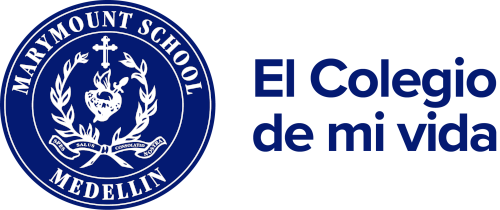
Consistent of a comprehensive and permanent process based on ethical, moral, cultural, and social principles, whose main objective is to guide students to achieve personal growth through teaching and living values, motivation, and example; It offers them the possibility of becoming unique, autonomous and tolerant, developing their potential to a maximum for their benefit as well as that of others. This process is led by the Training Council and positively impacts all the students at the school.
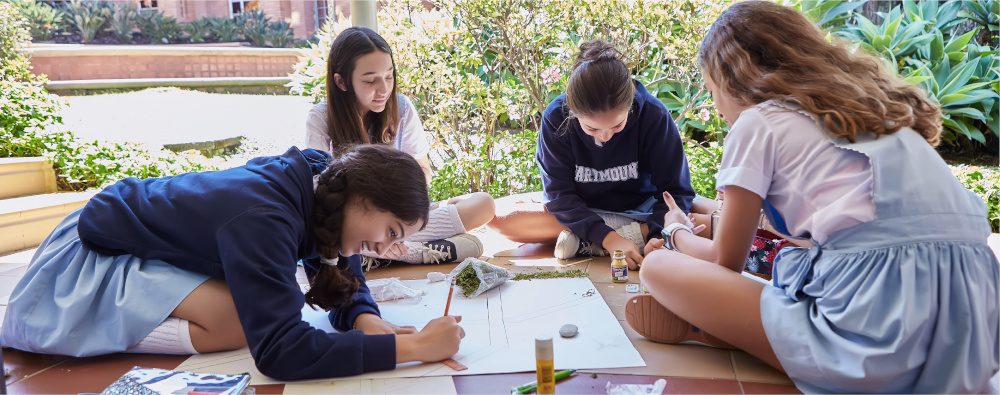
XXI Century Learning
XXI Century learning is called a global educational trend, based on neuroeducation, focused on student-centered learning process with the application of active pedagogical strategies and “Blended Learning”.
ACADEMIC EXCELLENCE
It is a permanent and comprehensive process, which seeks to enhance the abilities and strengths of students. Permanent monitoring, academic rigor, and support of the specific needs of each student are a fundamental part of this process.
STANDARDIZED TESTS
These include national (Avancemos, Saber), international (Cambridge Check Points, IGCSE, DELF, IELTS) and institutional tests that are administered to students to measure development of skills and competencies in different areas and certify appropriation of said skills. Institutional analysis of these tests allows the implementation of internal improvement plans to strengthen the academic excellence of the school.
THE INTERNATIONAL SCHOOL
The school´s curriculum is homologated with that of the University of Cambridge complying with international standards. Students who meet the requirements established by this University receive, together with their Academic Baccalaureate diploma, the International Baccalaureate diploma, which represents great benefits, such as the possibility of applying to both national and international universities as well as greater opportunities to apply for international scholarships. We have double international accreditation, granted by two prestigious entities: Council of International Schools (CIS) and New England Association of Schools and Colleges (NEASC). These two international associations are recognized worldwide for bringing together high-quality educational institutions and are endorsed by the Ministry of National Education of Colombia. We are a Multilingual School, Bilingual in English and teach French as a third language as of the 5th grade, based on the Common European Framework, which specifies that allocation of more than 65% of the school day in English allows the achievement of high level bilingualism. Our teachers are certified with international tests such as TKT, ILETS, DELF. We belong to the Network of Religious Schools of the Sacred Heart of Mary (RSHM), which includes 20 Institutions around the world, which offer great benefits such as exchanges with schools in Brazil and New York, participation in sports festivals, international meetings, attendance to the Annual Meeting of Rectors and exchange of knowledge and collaborative work between professors and psychologists from other schools around the world.
UNIVERSITY ACCEPTANCE
One hundred percent of our students are admitted to the university. The percentage of students who apply and are accepted in international universities grows every year. Many of them obtain access to this education thanks to scholarships obtained for their academic and personal merits, with the guidance of the International Counselor´s Office.
DEVELOPMENT OF XXI CENTURY SKILLS
These are the indispensable skills and capabilities needed to face the challenges posed by the new millennium. These include critical thinking, creativity, problem solving, communication, collaboration, digital, informational and media literacy, cognitive flexibility, adaptability, independence, interculturality, leadership, responsibility, emotional comprehension, and global citizenship.
Acquisition of Values
These begin with the family and are promoted and reinforced at school in such a manner that they permeate school life, through different everyday activities and specific training projects developed by the Institution.
Our values:

SPIRITUALITY

RESPECT

RESPONSIBILITY

SOLIDARITY

HONESTY
SPIRITUAL WHEN THE STUDENTS:
• Show a clear and transcendent purpose in life.
• Have an authentic conviction of their Faith and its principles.
• Enjoy healthy and harmonious relationships.
• Value others as much as themselves.
• Appreciate the simple things in life.
RESPECTFUL WHEN STUDENTS:
• Have positive feelings towards themselves, others, and their environment.
• Take care of their body´s, integrity, and health.
• Are aware that their actions, words, and omissions generate feelings in others.
• Apologize when they act incorrectly and care to repair the damage done or rectify their actions.
• Appreciate the intentions of others and comply with the common rules of courtesy.
• Use communication and language appropriately, avoiding affecting the dignity and good name of others.
• Act with sensitivity and solidarity in the face of the limitations of others.
• Express in a clear, timely and accurate way their feelings and opinions, and listen to others.
• Have a clear awareness of their rights and duties.
• Take care of and preserve their ecological and cultural environment.
• Have a sense of pride and belonging to the Colombian nationality.
RESPONSIBLE WHEN THEY:
• Believe in their potential and try to develop it to a maximum.
• Recognize and accept the consequences of their free and conscious acts.
• Do their job without any external pressure.
• Participate creatively in the achievement of objectives.
• Propose correct solutions to problems.
• Have clear personal goals and work to achieve them.
• Express their views and opinions and act coherently and abide by them.
• Recognize that it is a permanent educational process.
SOLIDARITY WHEN THEY:
• Are sensitive to the needs and feelings of the people around them.
• Work in the search for solutions to problems that affect their family, friends, city, and country.
• Provide a selfless and committed service to those who require it.
• Know how to show love, as well as to listen and pay attention to those who are close.
• Share what they are and what they have without expecting anything in return.
HONEST IF THEY:
• Are coherent with what they think, feel, say, and do.
• Are aware of what they have done well, but also what they have done wrong (recognize strengths and weaknesses).
• Not afraid to ask for or give help.
• Are delicate in the use and handling of their belongings, as well as that of others.
• Express themselves truthfully.
• Recognize what is right and appropriate for themselves and others.
• Accept their mistakes, correct them, and learn from them.
• Are authentic and transparent in their behaviors.
Educational Processes:
Development of socio-emotional skills, understood as the process through which people understand and manage emotions, set goals, show empathy for others, establish, and maintain healthy interpersonal relationships, and make responsible decisions. They are classified into:
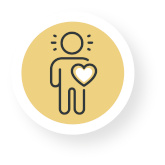
SELF-AWARENESS
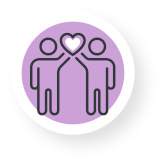
SOCIAL
AWARENESS
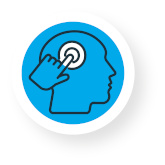
SELF-MANAGEMENT
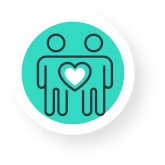
RELATIONSHIP
SKILLS

RESPONSIBLE
DECISION MAKING
Training Projects:

LIFE PROJECT

PROFESSIONAL
ORIENTATION

PROJECT SER
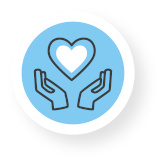
THE TIME
OF GOD

VYDA
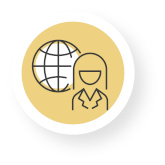
I AM A CITIZEN

SCHOOL LIFE
Balanced use of spare time
Marymount School curriculum also includes another series of activities that are framed within the process denominated “Training for the use of spare time”, whose objective is to promote the proper use of spare time, the development of skills and strengthening of discipline; For this purpose, it offers cultural, sports, academic and innovation activities, which take place after school hours.

SPORTS CLUB
Motor skills, gymnastics, figure and race skating, track and field, cheerleading, ultimate, soccer, volleyball, basketball, and softball.
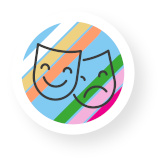
CULTURAL COMMITTEE
Artistic skills, theater,
dance, musical
ensembles, choir,
piano, guitar, painting,
crafts, yoga, French,
Portuguese, and
gastronomy.

ACADEMIC ACTIVITIES
Ecological Club, Robotics, United Nations Model, Medellín without taboo, Critical Thinking, National and International Alliances, Corporate – Government – Educational Alliances.
Global Citizenship
Educating individuals with ethical competencies that recognize and respect diversity, understand local and global events and develop cross-cultural communication skills thanks to the use of different languages. Citizens with leadership and service capacity, to generate transformation in their environments within a sustainable framework.

SUSTAINABLE MARYMOUNT
The Marymount sustainability model is included in the “2020 – 2024 Marymount XXI Century ecosystem of change” Strategic Direction Plan which proposes the formalization and socialization of a Social Responsibility Model, as well as the formulation and approval of environmental responsibility strategies for the school. Considering the above and the new trends regarding sustainability, a Sustainability Model that includes social and environmental lines was developed. Said model included strategies which were aligned with sustainable development objectives aimed at closing social gaps and generating well-being in the communities that require it, from the perspective of the school´s know-how . The following lines were defined:
• Academic counseling in bilingualism
• Consulting on training projects
• Training in positive discipline
• Consulting on Innovation, Development and Research
• Learning Center
Regarding Environmental Sustainability, the school includes it as a transversal axis and as a transformational element in the relationships between society, nature, and culture. Inclusion of this dimension is based on the recognition of local environmental problems and the formulation of local and interdisciplinary projects that allow contextual readings from the school to understand it and for the execution of actions, aimed at finding solutions and possible application and projection by all those involved in the problem.
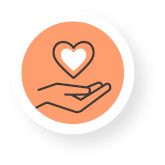
SOLIDARY MARYMOUNT
It unifies actions that allow the Marymount community, especially students, the opportunity to become aware of themselves, their community, and their social environment. It seeks a change in attitude by promoting actions that seek to experience and internalize the value of solidarity, promote the passage from reflection to action and work for a more just and humane society. Within this we find the Obligatory Social Service project.
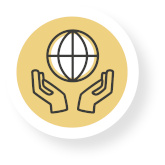
LANGUAGE INMERSIONS AND EXPEDITIONS
Immersions promote a global mentality, based on equality, respect and coexistence in the community. This experience not only provides students the opportunity to master a second or third language, but also to develop tolerance towards other cultures and the ability to adapt to different situations and ways of life.
